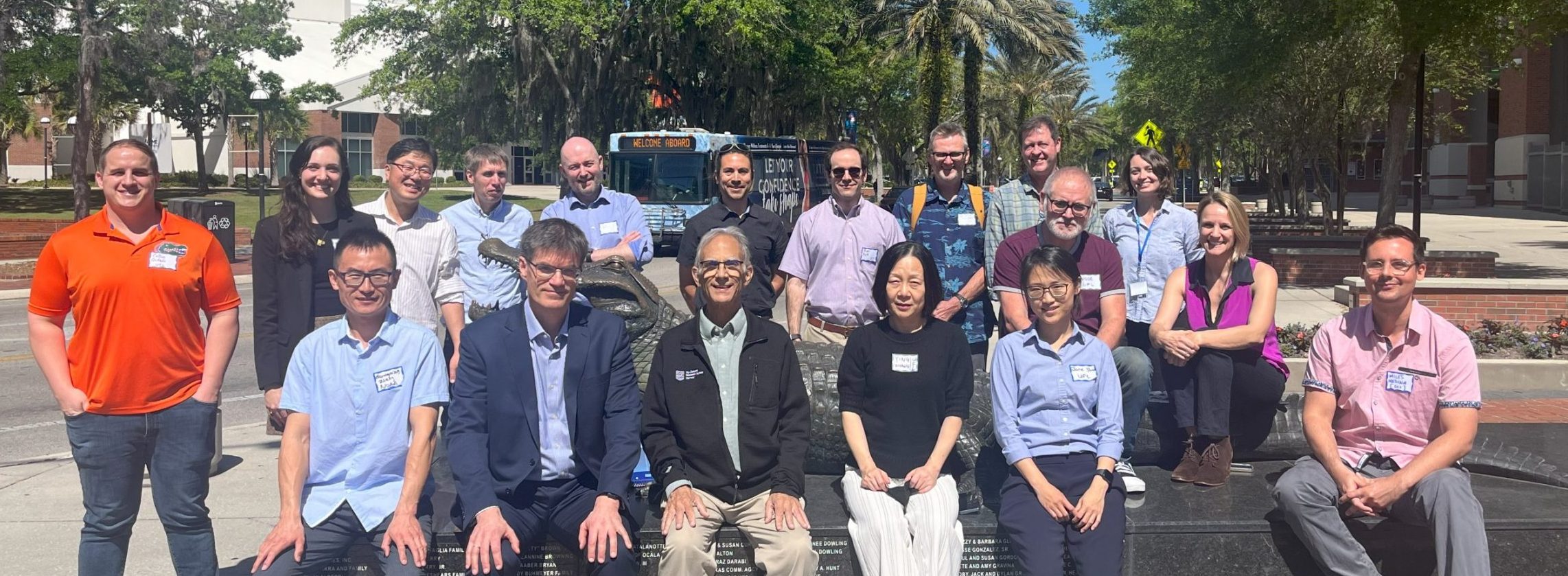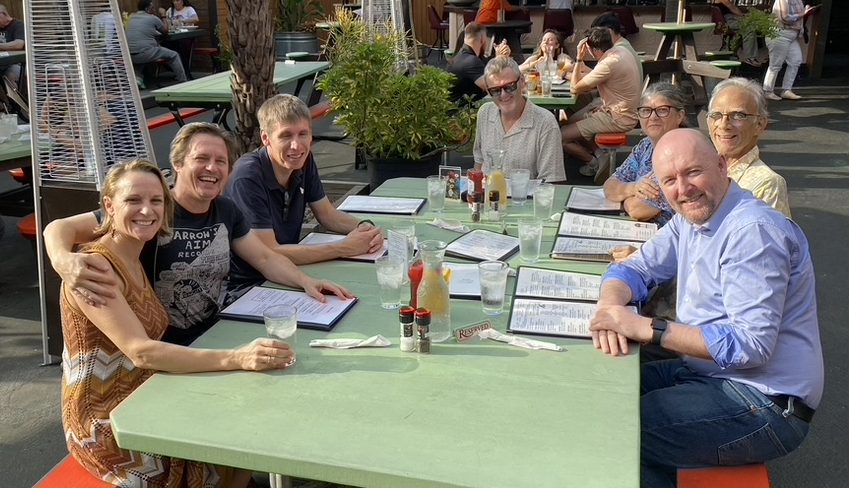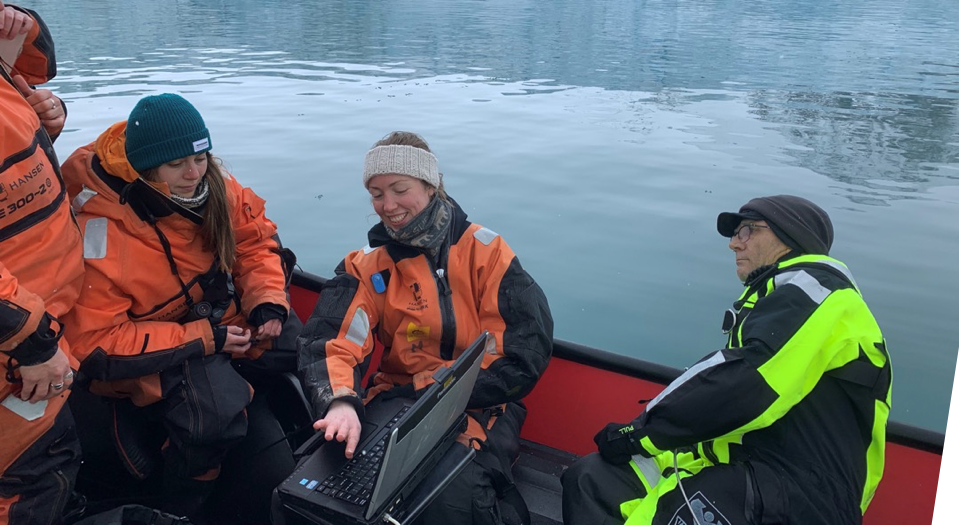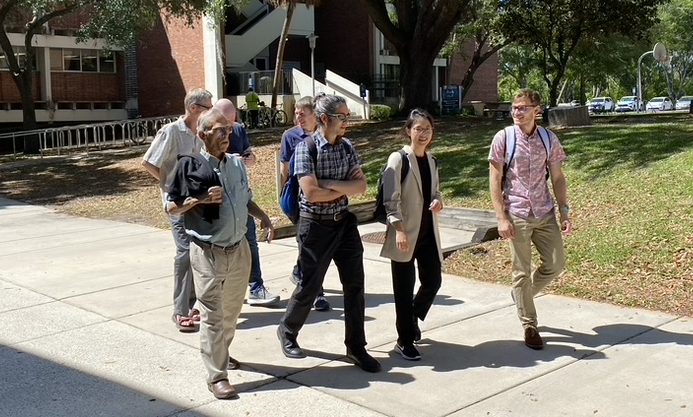Farewell to Our Friend Paul
Dear friends and colleagues,
It is with great emotion that I begin this month’s newsletter with a remembrance of our dear friend and talented colleague, Dr. Paul Gader, who passed away in early June. Paul was a world-leading computer scientist who loved nature and, perhaps influenced by his upbringing in the frigid North Dakota plains, really loved spending time along Florida’s sunny, wave-bathed coasts. We had the great privilege of benefitting from Paul’s profound expertise and infectious passion for the coast and environmental sustainability in the establishment and growth of the Center for Coastal Solutions. From the people who comprise the center to the work we do and how we do it, Paul’s brilliance is imprinted everywhere.

In 2019, Paul moved into an office suite in Weil Hall where Maitane Olabarrieta, Xiao Yu, Alex Sheremet, I and a few others also have our offices. He had heard that the faculty in the Engineering School of Sustainable Infrastructure and the Environment (ESSIE) were a nice, collaborative group. Given his research in environmental remote sensing, Paul figured he might offer us some unique and relevant expertise. From day one, it was a joy and adventure having Paul in our midst. His office door was always open and he engaged us一always with positivity and calmness一both as intellectuals and as people.
Sitting together to sift through messy data or grabbing a coffee to talk through challenges with students were routine connections with Paul. He took the time to learn about my interests and family and shared details about his hobbies and loved ones with me, creating a closeness that can be rare with colleagues. After sharing with Paul my desire to throw an epic holiday party to unwind after the busy Fall 2019 semester, he quickly volunteered to show up with a trio of friends from his jazz band to play and ‘class up’ the party. That night, we got to experience Paul the musician, an animated, focused and accomplished saxophonist who carried the party for hours! As the evening wound down, Paul, my husband and I shared a moment of wholesome satisfaction that we had co-created an atmosphere in which so much laughter and love could be enjoyed.

Next to the faculty offices, Paul set up a bullpen of desks for his students, stocked with powerful computers and defined by a central gathering space for weekly lab meetings over pizzas to which he welcomed a hodgepodge of students from other groups, as well as his ‘lab’ i.e., a closet painted jet-black wall to ceiling, where he calibrated and used his spectrometer. The delight he took in perfecting code with his students and taking the ‘computer nerds’ on field campaigns into the forest to collect ground-truthing data was infectious. In essence, Paul and his ‘Computing For Life’ research group took root in our community, becoming an active part of the day-to-day hum of the office.
Soon many of us began to develop meaningful collaborations with Paul. He helped our faculty and students with everything from finding the right algorithm to process videos of boat traffic to crafting approaches to capitalize on UF’s supercomputing resources to accelerate coastal circulation simulations.
At some point, we realized the huge potential for innovative research that could come from weaving computer science into coastal oceanography, ecology and engineering. We decided to apply for an Engineering Research Center (ERC) grant, a large grant program administered by the National Science Foundation, with Paul as the lead investigator. To brainstorm ideas, we hosted a series of five workshops, Innovating Coastal Resilience, in the summer of 2020 that drew more than 300 participants from over 40 organizations. Among the insights that emerged was the need for powerful Earth Systems Models, fed by high resolution, real-time data, that could inform coastal human health, economic and environmental management and policy interventions. The linchpin to achieving such a bold vision was a powerful system for integrating and processing enormous quantities of data into useful information. Paul had the vision for how it could work and the expertise required to build it. Although we were not awarded the grant, the ideas and team that took shape during the writing of the proposal became the intellectual foundations from which the Center for Coastal Solutions was launched in Fall 2020.
The final chapter in Paul’s academic career involved a 2021-2022 sabbatical to the Norway University for Science and Technology’s Center for Autonomous Marine Systems and Operations (NTNU AMOS). Throughout the writing of our ERC grant, Paul would say repeatedly, “We should work with these Norwegians. They have mountains of data and are producing excellent work in ocean and coastal sensing.” Paul jumpstarted this international collaboration by moving to Norway and embedding himself in a network of NTNU researchers. His task was to process and integrate spectral reflectance data from multiple sensor platforms (e.g. cube-satellites, autonomous surface vehicles, and underwater robots) developed by NTNU and co-deployed as ‘observational pyramids’ during field campaigns.

In Norway, Paul was in his happy place: focused on pulling out amazing discoveries from terabytes of data, engaged with kind, smart and creative colleagues, and surrounded by beautiful and unique scenery that he enjoyed on regular hikes. On my video calls with Paul during this time, I was entertained by the fluffy beard he grew to keep his face warm and his photos of frozen, Norwegian landscapes that he adopted as his zoom backgrounds. He exuded pride in having built some street-cred that he could thrive in such beautiful, but harsh conditions! Like with us, Paul became an integral collaborator and true friend to the NTNU team一to such an extent that they asked him to spend an additional six months in Norway.
In April of this year, we had the privilege of hosting Paul’s Norwegian colleagues alongside National Oceanic and Atmospheric Administration (NOAA) collaborators here in Gainesville. Paul joined us for the two-day workshop, proudly wearing the NTNU-embroidered wool sweater that he earned by working above the Arctic Circle. Consistent with our other interactions with him over the years, Paul’s dry wit and curiosity had us all laughing and engaging with one another. He challenged us to ‘think big and differently’ about the three-way collaboration that we were there to scope out. What came out of the meeting was an ambitious, but well thought-out path for CCS, NTNU AMOS and NOAA NESDIS to leverage our expertise and resources to transform the science and societal impact of coastal observations, experimentation and modeling.

I am very pleased to share that just this week the University of Florida and the Norway University of Science and Technology co-signed a Memorandum of Understanding to chart our path forward in the spirit of Paul’s vision for our collaboration. And, we are already working on collaborative papers with our NOAA colleagues. Thus, great things are ahead as we further co-develop our research and educational programs. Through this work and other efforts, my colleagues and I will continue to build on and celebrate his life’s life work in all we do.
I am grateful to have had Paul as a colleague and a friend, to know him, learn from him, and work side by side with him. And, I thank his wife Libby, daughter Leigh, sisters and family for cherishing and encouraging Paul’s passion as an academic and dedication to his career. In listening to the eulogy given by Paul’s sister Carla last week, it was clear Paul was beloved by all those close to him in his life. May we take comfort in knowing that someone so cherished will not be forgotten.